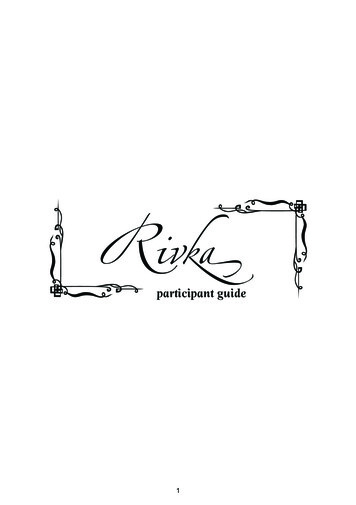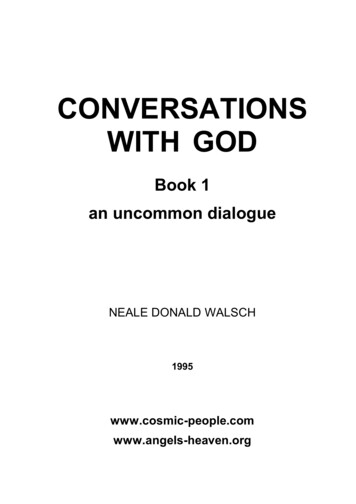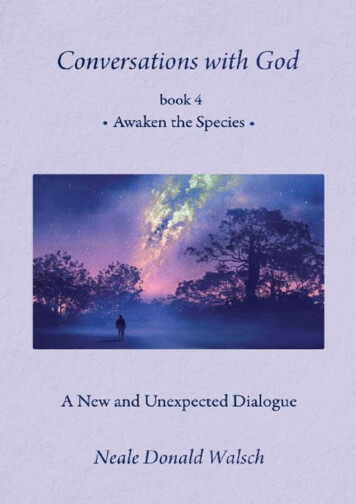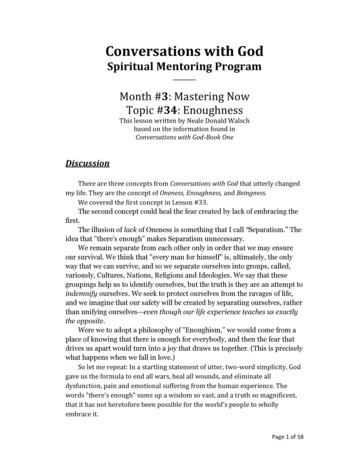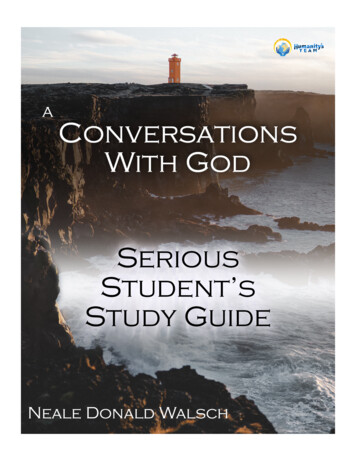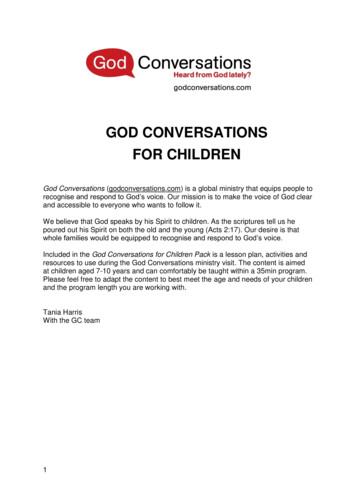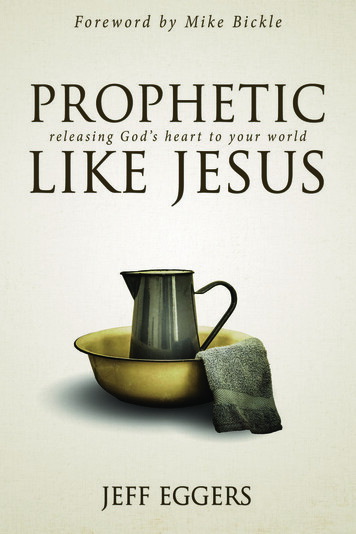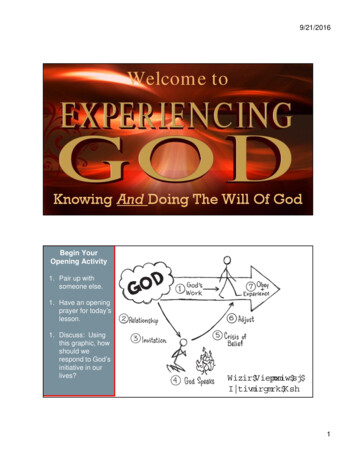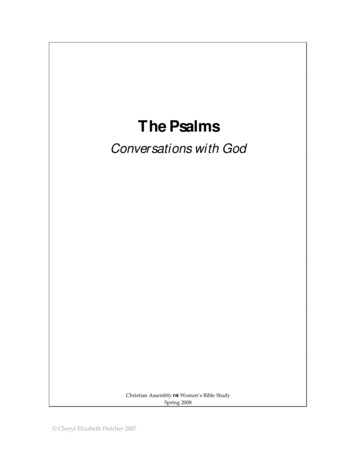
Transcription
The PsalmsConversations with GodChristian Assembly G Women’s Bible StudySpring 2008 Cheryl Elizabeth Fletcher 2007
Praise the Lord!Praise God in His sanctuary;Praise Him in His mighty expanse.Praise Him for His mighty deeds;Praise Him according to His excellent greatness.Praise Him with trumpet sound;Praise Him with harp and lyre.Praise Him with timbrel and dancing;Praise Him with stringed instruments and pipe.Praise Him with loud cymbals;Praise Him with resounding cymbals.Let everything that has breath praise the LORD.Praise the LORD!Psalm 1502 Cheryl Elizabeth Fletcher 2007
Greetings!Welcome to Christian Assembly’s Women’s Bible Study. We are so glad that you arehere. We have prayed for you in anticipation of a truly wonderful eight weeks. Wepray that in the weeks ahead you will find connection, friendship, and a deeperunderstanding of God’s Word and God’s love for you. But more than anything else wepray that you will grow in your commitment to Jesus Christ, regardless of where youfind yourself on the journey today.This study is from the book of Psalms, focusing on Conversations with God. Together wewill learn how to pray the Psalms for our own lives. Cheryl Fletcher developed thisgreat curriculum and will be teaching it this session.We invite you to delve into this process: commit to be here every week, work throughthis devotional guide, open your heart and life to the ladies at your table and expect Godto do a transforming work. This may sound like a lot, but we have found over the yearsthat God is willing and able to use the Bible Study to touch, heal and challenge women.Your Table Leader is available for any concerns or questions you may have. She willguide you in terms of our schedule and process. Our desire is that you will feel safe,cared for and, ultimately, transformed.We are so pleased that you are on this journey with us. May you find amazing momentsof conversation with the God who loves you.Blessings on you!Kathy Christopher Cheryl Elizabeth Fletcher 20073
4 Cheryl Elizabeth Fletcher 2007
The Psalms: Conversations with GodThe Purpose of this StudyThe Psalms are poems written to be prayed and sung. Our purpose for this study is to learn toconverse with and to worship God using the Psalms as a guide. For centuries Christians havelearned to pray by praying the Psalms.Eugene Peterson makes the following observation in his classic book, Answering God: The Psalmsas Tools for Prayer ‐‐“ the Psalms are necessary. Is necessary too strong a word? They are not necessary to salvation– “by grace you have been saved through faith; and this is not your own doing, it is the gift of God –not because of works, lest anyone should boast” (Eph. 2:8-9). Our prayers, whether clumsy orskilled, heretical or orthodox, verbatim from the Psalter (the book of Psalms) or ad-libbed from asinking ship, get us no merit with God. Nor are the Psalms necessary to validate our prayers asgenuine – God hears anything we whisper or shout, say or sing. Right words and correct forms arenot prerequisites to a heavenly audience. God is not fastidious in these matters.“All the same, they are necessary. The consensus on this, throughout the church’s praying life isimpressive. If we wish to develop in the life of faith, to mature in our humanity, and to glorify Godwith our entire heart, mind, soul, and strength, the Psalms are necessary. We cannot bypass thePsalms. They are God’s gift to train us in prayer that is comprehensive and honest “ If we dismiss the Psalms, preferring a more up-to-date and less demanding school of prayer, wewill not be without grace, but we will miss the center where Christ worked on His praying. (For)Christ prayed the Psalms ”So, our purpose is to learn to pray. And to pray is to enter into conversation with God. To pray isto approach the God who first approaches us (John 1:10‐11, 14) and the Psalms guide us in thisconversation. Athanasius, a 4th century theologian, said, “Most scriptures speak to us; the Psalmsspeak for us.” And Peterson in another of his writings, Eat this Book: A Conversation in the Art ofSpiritual Reading, adds:“Using the Psalms as a school of prayer, praying these prayers we get a feel for what is appropriateto say as we bring our lives into attentive and worshipping response to God as He speaks to us. Aswe do this, the first thing we realize is that in prayer anything goes. Virtually everything human isappropriate as material for prayer: reflections and observations, fear and anger, guilt and sin,questions and doubts, needs and desires, praise and gratitude, suffering and death. Nothinghuman is excluded (and) prayer is access to everything that God is for us: holiness, justice,mercy, forgiveness, sovereignty, blessing, vindication, salvation, love, majesty, glory. The Psalmsare a detailed demonstration that prayer brings us into the welcoming presence of God as Hegenerously offers Himself, just as He is, to us.”The Bible Study and the HomeworkThis booklet will serve as your guide through this study. It’s broken into five studies a week. Youare not required to complete these exercises but know that they are designed to complement thediscussion in our times together. More importantly, this booklet is intended to direct you in theScripture as you spend time each day meeting with our Lord Jesus.It is crucial to remember that nothing said in our time together will ever match what God will sayto you through His holy, living and active word ‐ the Bible (Hebrews 4:12; 2 Timothy 3:16‐17). Cheryl Elizabeth Fletcher 20075
Prayer ListPlease make it your habit to pray regularly for this Bible Study group. Pray that God will speak toyou through the Bible, the teaching and through the women you meet with each week. Pray forthose who sit at your table. Take a minute to write their names here as a reminder to pray.The Women At My Table:6 Cheryl Elizabeth Fletcher 2007
The Psalms: Conversations with GodEach week this guide prepares you for the discussion you will have around the table at Women’sBible Study. Start using this guide the day after Bible Study. Here is an overview of the study andthe date you begin each week ‐Week of Study StartsTopicPrimary PsalmPage1 – January 9/10Introduction2 ‐ January 10/11Prayer and MeditationPsalm 1113 ‐ January 17/18Praying to a PersonPsalm 139194 ‐ January 24/25Praying our DarknessPsalm 32275 ‐ January 31/Feb. 1Praying our DespairPsalm 42356 ‐ February 7/8Praying our EnvyPsalm 73437 – February 14/15Praying the GospelPsalm 103518 – February 21/22Praying our AllegiancePsalm 100599To pray involves knowing ourselves as well as the One we pray to. Each day this guide will pointyou to a deeper understanding of self, God and prayer. Some weeks you will spend the entiretime in one Psalm and on other weeks you may be guided through multiple passages ofscripture.The beautiful thing about a study like this is that it combines many of the allies of our faith. Byallies I mean the gifts that God has given us to strengthen our fellowship with Him. Three ofthese allies are: (1) The Scripture; (2) The Holy Spirit; and (3) The Church (the community ofChrist‐followers).In this study you will be directed five days a week to engage with God through the Scripture.And every second of every day God gives His followers His Holy Spirit who is God Himself ‐guiding us, teaching us, comforting us and convicting us. It is the Holy Spirit who gives usunderstanding as we read the Bible. And then, each week you will gather in community toprocess together what God is revealing to you and teaching you. Being alone with God and beingwith God in community are great gifts we have as followers of Jesus. Cheryl Elizabeth Fletcher 20077
8 Cheryl Elizabeth Fletcher 2007
Session 1 – Introduction to the PsalmsPrayer Requests Cheryl Elizabeth Fletcher 20079
Session 1 – Introduction to the Psalms10 Cheryl Elizabeth Fletcher 2007
Prayer and MeditationWeek Two &Day OneWe will spend this first week meditating upon Psalm 1. This Psalm was strategically placed at thebeginning to serve as an introduction to the entire collection of Psalms. Note that it is not a prayerbut it is a poem setting up the book of Psalms. The first Psalm that is an actual prayer is Psalm 3.But, Psalm 1 is crucial to setting before the reader of Psalms the value of meditating on Scripture.This week we want to consider and practice meditating on the words in the Bible.Read, Meditate Upon & Pray: Psalm 1To meditate upon this Psalm is to read it slowly, reflectively and repeatedly. When the ChurchLeader Martin Luther meditated on scripture he said that he looked for four things (madememorable by the acrostic TACS): (1) T – Teaching – what is this passage teaching me?(2) A – Adoration – What do I adore about God from this passage? (3) C – Confession – What canI confess? (4) S – Supplication (or asking) – What can I ask God for on the basis of this passage?Luther said he would read until “his heart burned”.Seek to sit with this Psalm for as long as you can. Try using Luther’s suggestion to guide yourprayer and meditation today.(1) What is this passage teaching me?(2) What do I adore about God from this passage?(3) What can I confess?(4) What can I ask God for on the basis of this passage? Cheryl Elizabeth Fletcher 200711
Prayer and MeditationWeek Two &Day Two“ we do not have to acquire expertise in the Psalms before we use them; they themselves –prayers that train us in prayer – are the means to proficiency. We don’t have to understand acrowbar before we put it to use. Understanding comes with use.“The practice of Christians in praying the Psalms is straightforward: simply pray through thePsalms, Psalm by Psalm, regularly That’s it: open our Bibles to the book of Psalms and praythem – sequentially, regularly, faithfully across a lifetime. This is how most Christians for most ofthe Christian centuries matured in prayer. Nothing fancy. Just do it. The praying itself isdeliberate and leisurely, letting (as St. Benedict directed) the motions of the heart come intoharmony with the movement of the lips.” (From Answering God: The Psalms as Tools for Prayer, byEugene Peterson, pp. 5‐6).Read, Meditate Upon & Pray: Psalm 1We will continue praying this Psalm. It is often helpful to return daily to the same passage ofScripture – this helps us see and hear new things.Consider: Is there one particular line or verse or word that strikes you as you read? If so, record ithere and reflect upon how God is speaking to you today –12 Cheryl Elizabeth Fletcher 2007
Prayer and MeditationWeek Two &Day ThreeRead, Meditate Upon & Pray: Psalm 1Draw: The Psalms were written to elicit emotion as well as to guide us in worship and prayer. Tostimulate our imagination it is often helpful to force ourselves to think outside the box. For thispurpose you will need to call forth your inner‐artist and try drawing this Psalm. You might drawmultiple pictures or just one. If you are completely opposed to drawing then write down keywords. Use the space below to draw. Cheryl Elizabeth Fletcher 200713
Prayer and MeditationWeek Two &Day FourRead, Meditate Upon & Pray: Psalm 1Consider: The Psalmist describes two types of people ‐ the Righteous (the blessed man) and theWicked. Use the following chart to record the characteristics of each.The Righteous/BlessedThe WickedWhen have you received bad counsel/advice? Where does it typically come from?Who or what can you trust for good advice?When the Psalmist says that the righteous delight in the Law of the Lord he is referring to all ofScripture ‐ what does it look like for you to delight in the words of the Bible? Is there a passage orverse that you particularly love? Why?14 Cheryl Elizabeth Fletcher 2007
Prayer and MeditationWeek Two &Day FiveRead, Meditate Upon & Pray: Psalm 1Record: Write down five words that seem key to you from this passage and look up theirdefinitions in a dictionary or at www.dictionary.com. Write them here –Write Out Your Prayer to God Today ‐ Cheryl Elizabeth Fletcher 200715
16 Cheryl Elizabeth Fletcher 2007
Session 2 – Prayer and Meditation – Psalm 1Prayer Requests Cheryl Elizabeth Fletcher 200717
Session 2 – Prayer and Meditation – Psalm 118 Cheryl Elizabeth Fletcher 2007
Praying to a PersonWeek Three &Day OneRead, Meditate Upon & Pray: Psalm 139Reflect: After you have read through Psalm 139 try re‐writing it to make it more personal to you.You might use your name in it or insert the pronouns I, Me and Mine. Make this Psalm yourPsalm. Cheryl Elizabeth Fletcher 200719
Praying to a PersonWeek Three &Day TwoRead, Meditate Upon & Pray: Psalm 139Today the Psalm is given to you here – circle all the repeating words and concepts. Spend timepraising God for who He is.1 O Lord, You have searched me andknown me.2 You know when I sit down and whenI rise up; You understand my thought fromafar.3 You scrutinize my path and my lyingdown, And are intimately acquainted withall my ways.4 Even before there is a word on mytongue, Behold, O Lord, You know it all.5 You have enclosed me behind andbefore, And laid Your hand upon me.6 Such knowledge is too wonderful forme; It is too high, I cannot attain to it.7 Where can I go from Your Spirit?Or where can I flee from Your presence?8 If I ascend to heaven, You are there;If I make my bed in Sheol, behold, You arethere.9 If I take the wings of the dawn,If I dwell in the remotest part of the sea,10 Even there Your hand will lead me,And Your right hand will lay hold of me.11 If I say, “Surely the darkness willoverwhelm me, And the light around mewill be night,”12 Even the darkness is not dark toYou, And the night is as bright as the day.Darkness and light are alike to You.13 For You formed my inward parts;You wove me in my mother’s womb.14 I will give thanks to You, for I amfearfully and wonderfully made;20 Cheryl Elizabeth Fletcher 2007Wonderful are Your works,And my soul knows it very well.15 My frame was not hidden from You,When I was made in secret, And skillfullywrought in the depths of the earth;16 Your eyes have seen my unformedsubstance; And in Your book were allwritten The days that were ordained for me,When as yet there was not one of them.17 How precious also are Yourthoughts to me, O God! How vast is the sumof them!18 If I should count them, they wouldoutnumber the sand. When I awake, I amstill with You.19 O that You would slay the wicked,O God; Depart from me, therefore, men ofbloodshed.20 For they speak against Youwickedly, And Your enemies take Your namein vain.21 Do I not hate those who hate You, OLord? And do I not loathe those who rise upagainst You?22 I hate them with the utmost hatred;They have become my enemies.23 Search me, O God, and know myheart; Try me and know my anxiousthoughts;24 And see if there be any hurtful wayin me, And lead me in the everlasting way.
Praying to a PersonWeek Three &Day ThreeRead, Meditate Upon and Pray: Psalm 139Record: Make a list here of all that this Psalm reveals about God.Write Out Your Own Love Letter to God. Cheryl Elizabeth Fletcher 200721
Praying to a PersonWeek Three &Day FourRead, Meditate Upon & Pray: Romans 8:26‐39 (yes, a new passage!)Consider: What does this passage tell us about God?How is this passage similar to Psalm 139?What encouragement/comfort do you find in Romans 8:26‐39?22 Cheryl Elizabeth Fletcher 2007
Praying to a PersonWeek Three &Day FiveRead, Meditate Upon & Pray: John 17Consider: Psalm 139 tells us that God knows us and is with us and is for us. John 17 tells us thatJesus prays for us (look also at Hebrews 7:25).Record: What does Jesus pray for those who follow Him?What does John 17 reveal about Jesus and God, the Father? Cheryl Elizabeth Fletcher 200723
24 Cheryl Elizabeth Fletcher 2007
Session 3 – Praying to a Person – Psalm 139Prayer Requests Cheryl Elizabeth Fletcher 200725
Session 3 – Praying to a Person – Psalm 13926 Cheryl Elizabeth Fletcher 2007
Praying our DarknessWeek Four &Day OneRead, Meditate Upon & Pray: Psalm 32Again, try using Luther’s approach to meditation.(1) What is this passage teaching me?(2) What do I adore about God from this passage?(3) What can I confess?(4) What can I ask God for on the basis of this passage? Cheryl Elizabeth Fletcher 200727
Praying our DarknessWeek Four &Day TwoPray: Ask the Lord to give you insight into the Scripture you read today.Read and Record – Look at the following passages and record what they tell us about sin andGod’s response to sin. Use the chart below.PassageSinGod’s ResponseRomans 5:8Hebrews9:22Romans6:8‐231 Peter 3:181 John 1:8‐9Romans3:23‐25For this passage consider ‐ why do youthink that sin is described as “falling shortof the glory of God”?Considering Romans 6:8‐23 – Describe a time when sin felt like being enslaved? When didforgiveness feel like freedom?Spend time reflecting on God’s goodness and grace toward you today.28 Cheryl Elizabeth Fletcher 2007
Praying our DarknessWeek Four &Day ThreeRead, Meditate Upon & Pray: Psalm 51Note: This is the Psalm that David wrote after he was confronted with his adulterousaffair with Bathsheba and the subsequent murder of her husband. You can read theaccount of this in 2 Samuel 11‐12.Consider: What does this Psalm teach you about prayer? What emotions are stirred as youmeditate upon this Psalm?What does this Psalm reveal about David’s relationship with God?How would you describe your relationship with God today?When you consider how God relates to you, what are you most thankful for? Cheryl Elizabeth Fletcher 200729
Praying our DarknessWeek Four &Day FourRead, Meditate Upon & Pray: Luke 7:36‐50Imagine: Put yourself in the place of this woman – If you are this woman ‐ what are you feeling?What are you afraid of?What do you hope for?Why are you there?What do you hear Jesus say to you?Consider: What do you learn about the forgiveness of God from this passage?What do you adore about Jesus?30 Cheryl Elizabeth Fletcher 2007
Praying our DarknessWeek Four &Day FiveRead, Meditate Upon & Pray: Luke 19:1‐10Imagine: Put yourself in the place of Zaccheus – If you are Zaccheus ‐What are you feeling?What are you afraid of?What do you hope for?Why do you so desperately want to see Jesus?What do you hear Jesus saying to you?Consider: What did Zaccheus say to Jesus? Why?What do you adore about Jesus? Cheryl Elizabeth Fletcher 200731
32 Cheryl Elizabeth Fletcher 2007
Session 4 – Praying our Darkness – Psalm 32Prayer Requests Cheryl Elizabeth Fletcher 200733
Session 4 – Praying our Darkness – Psalm 3234 Cheryl Elizabeth Fletcher 2007
Praying our DespairWeek Five &Day OneRead, Meditate Upon & Pray: Psalm 42Consider: What seems to be the Psalmist’s situation?Have you ever felt what the Psalmist describes?What is the hope given in this Psalm? How do you need this hope today? Cheryl Elizabeth Fletcher 200735
Praying our DespairWeek Five &Day TwoRead, Meditate Upon & Pray: Psalm 42Again, try using Luther’s approach to meditation –(1) What is this passage teaching me?(2) What do I adore about God from this passage?(3) What can I confess?(4) What can I ask God for on the basis of this passage?36 Cheryl Elizabeth Fletcher 2007
Praying our DespairWeek Five &Day ThreeRead, Meditate Upon & Pray: Psalm 42The Psalmist uses very vivid imagery to describe his situation. Here are some key words andtheir definitions.1Pantdesire, long for, i.e., to have a strong wish or yearning pant for someone or situation asa figurative extension of the panting of an animal which is overheated or dehydrated; tobreathe hard and quickly, as after exertion; to gasp, as for air; to long with breathless orintense eagerness; yearn: to pant for revenge.Soulsoul, self, life, creature, person, appetite, mind, living being, desire, emotion, passion.1a that which breathes, the breathing substance or being, soul, the inner being of man. 1bliving being. 1c living being (with life in the blood). 1d the man himself, self, person orindividual. 1e seat of the appetites. 1f seat of emotions and passions. 1g activity of mind.Thirst thirst, be thirsty, i.e., be in a dehydrated state and so desire to drink fluid; desire,formally, thirst, i.e., to intensely desire something as a figurative extension of be in a stateof needing to drink waterDespairto bow, crouch, bow down, be bowed down. 1a1 to be bowed down, beprostrated, be humbled; be in grief, be downcast, formally, bow low, i.e., feel sorrow asa figurative extension of being in a mourning bowed position; loss of hope; hopelessness;someone or something that causes hopelessness; to lose, give up, or be without hope.Hope to wait, hope, expect; be in a certain state, implying a resolution to the waiting; thefeeling that what is wanted can be had or that events will turn out for the best; a personor thing in which expectations are centered; to look forward to with desire andreasonable confidence; to believe, desire, or trust.Consider: What do these words reveal about what the Psalmist wants to communicate in hisprayer?These definitions come from the following sources: James Swanson, Dictionary of Biblical Languages With Semantic Domains : Hebrew (Old Testament), electronic ed.(Oak Harbor: Logos Research Systems, Inc., 1997), DBLH 6864; James Strong, The Exhaustive Concordance of the Bible : Showing Every Word of the Text of the CommonEnglish Version of the Canonical Books, and Every Occurrence of Each Word in Regular Order., electronic ed. (Ontario: Woodside Bible Fellowship., 1996), H5315.; andwww.dictionary.com.1 Cheryl Elizabeth Fletcher 200737
Praying our DespairWeek Five &Day FourRead, Meditate Upon & Pray: 2 Corinthians 1:3‐11Consider: How is God described in this passage?What was Paul’s circumstance as he wrote these words?What does this passage say about Hope?What do you need to trust God for today? What will it look like in your life for you to trust Himwith this particular person, relationship or circumstance?38 Cheryl Elizabeth Fletcher 2007
Praying our DespairWeek Five &Day FiveRead, Meditate Upon & Pray: Psalm 42:1‐2 and Hebrews 4:9‐16Record: Use the space here to write or draw your thoughts, prayers, praises and observations onthese two passages. Cheryl Elizabeth Fletcher 200739
40 Cheryl Elizabeth Fletcher 2007
Session 5 – Praying our Despair – Psalm 42Prayer Requests Cheryl Elizabeth Fletcher 200741
Session 5 – Praying our Despair – Psalm 4242 Cheryl Elizabeth Fletcher 2007
Praying our EnvyWeek Six &Day OneRead, Meditate Upon & Pray: Psalm 73(1) What is this passage teaching me?(2) What do I adore about God from this passage?(3) What can I confess?(4) What can I ask God for on the basis of this passage? Cheryl Elizabeth Fletcher 200743
Praying our EnvyWeek Six &Day TwoRead, Meditate Upon & Pray: Psalm 73Consider: The Psalmist comes close to stumbling when he finds himself envious of others.Francis Schaeffer, in True Spirituality, says this about envy:When I have a wrong regret that others have what I do not possess, and this regret isallowed to grow, very quickly it comes to make me dislike the person himself. Surely weall have felt this. As the Holy Spirit makes us increasingly honest with ourselves, we mustacknowledge that often we have a dislike of a person because we have had wrong desiretoward something of his. More than this, if I would be happy if he were to lose something,the next step in the external world is moving either subtly or more openly to cause him tohave the loss, either in lying about him, stealing from him, or whatever it may be.How has envy kept you from loving God and/or loving others (Matthew 22:36‐40)?What changed the Psalmist’s attitude?Record: Write a short prayer to God here –44 Cheryl Elizabeth Fletcher 2007
Praying our EnvyWeek Six &Day ThreeRead, Meditate Upon & Pray: James 3:13‐18Consider: Using the chart, record how James contrasts the wisdom from below with the wisdomfrom above.Wisdom Not from Above (vv. 14-16)Wisdom from Above (vv. 17-18)Pray: Ask the Lord to increase in you and those you love the wisdom from above. Take time toconfess where you might be living in the wisdom that is not from above. Rejoice in God’spatience with us! Cheryl Elizabeth Fletcher 200745
Praying our EnvyWeek Six &Day FourRead, Meditate Upon & Pray: Psalm 73:25‐28 and Psalm 84Record: Write out your personal prayer to God.46 Cheryl Elizabeth Fletcher 2007
Praying our EnvyWeek Six &Day FiveRead, Meditate Upon & Pray: Psalm 37:1‐26(1) What is this passage teaching me?(2) What do I adore about God from this passage?(3) What can I confess?(4) What can I ask God for on the basis of this passage? Cheryl Elizabeth Fletcher 200747
48 Cheryl Elizabeth Fletcher 2007
Session 6 – Praying our Envy – Psalm 73Prayer Requests Cheryl Elizabeth Fletcher 200749
Session 6 – Praying our Envy – Psalm 7350 Cheryl Elizabeth Fletcher 2007
Praying the GospelWeek Seven &Day OneRead, Meditate Upon & Pray: Psalm 103Record: List all that this Psalm says about who God is and what He does. Cheryl Elizabeth Fletcher 200751
Praying the GospelWeek Seven &Day TwoRead, Meditate Upon & Pray: Psalm 103:1‐5Consider: The following definition of redemption.Redemption — the purchase back of something that had been lost, by the payment of aransom. The Greek word so rendered is apolutrosis, a word occurring nine times inScripture, and always with the idea of a ransom or price paid; (see Matthew 20:28; Mark10:45).There are many passages in the New Testament which represent Christ’s sufferingsunder the idea of a ransom or price, and the result thereby secured is a purchase orredemption (comp. Acts 20:28; 1 Cor. 6:19, 20; Gal. 3:13; 4:4, 5; Eph. 1:7; Col. 1:14; 1 Tim.2:5, 6; Titus 2:14; Heb. 9:12; 1 Pet. 1:18, 19; Rev. 5:9). The idea running through all thesetexts is that of payment made for our redemption. The debt against us is not viewed assimply cancelled, but is fully paid. Christ’s blood or life, which he surrendered forthem, is the “ransom” by which the deliverance of his people from the servitude of sinand from its penal consequences is secured. It is the plain doctrine of Scripture that“Christ saves us neither by the mere exercise of power, nor by his doctrine, nor by hisexample, nor by the moral influence which he exerted, nor by any subjective influence onhis people, whether natural or mystical, but as a satisfaction to divine justice, as anexpiation for sin, and as a ransom from the curse and authority of the law, thusreconciling us to God by making it consistent with his perfection to exercise mercytoward sinners” (Hodge’s Systematic Theology). 2What does it mean for God to be your Redeemer?Consider: What do the following passages reveal about redemption and Jesus?PassageRedemption and Jesus1 Peter 1:18‐19Ephesians 1:7Revelation 5:8‐102M.G. Easton, Eastonʹs Bible Dictionary (Oak Harbor, WA: Logos Research Systems, Inc., 1996, c1897).52 Cheryl Elizabeth Fletcher 2007
Praying the GospelWeek Seven &Day ThreeRead, Meditate Upon & Pray: Psalm 104 (yes, the Psalm that follows Psalm 103)Jeanne Guyon, in Experiencing the Depths of Jesus Christ, says this about praying the Scripture –and, for our purposes, praying the Psalms: “ the best way to understand the mysteries that arehidden in the revelation of God and to enjoy them fully is to let them be imprinted deeply in yourheart. How? You may do this by dwelling on that revelation just as long as it gives you a sense ofthe Lord. Do not be quick to go from one thought to another. Stay with what the Lord hasrevealed to you; stay there just as long as a sense of the Lord is also there.”Record: Write down words or thoughts that stand out to you as you meditate on Psalm 104. Cheryl Elizabeth Fletcher 200753
Praying the GospelWeek Seven &Day FourRead, Meditate Upon & Pray: Psalm 103:17Consider: The word for God’s love in verse 17 can be translated, “steadfast love” or“lovingkindness.”Lovingkindness loyal love, unfailing kindness, devotion, i.e., a love or affection that issteadfast based on a prior relationship (Ex 34:6, 7).3Lamentations 3:19‐26Remember my affliction and my wandering,the wormwood and bitterness.Surely my soul remembersAnd is bowed down within me.This I recall to my mind,Therefore I have hope.The Lord’s lovingkindnesses indeed never cease,For His compassions never fail.They are new every morning;Great is Your faithfulness.“The Lord is my portion,” says my soul,“Therefore I have hope in Him.”The Lord is good to those who wait for Him,To the person who seeks Him.It is good that he waits silentlyFor the salvation of the Lord.Consider: What is significant to you today about the Lord’s loving‐kindness?James Swanson, Dictionary of Biblical Languages with Semantic Domains: Hebrew (Old Testament), electronic ed. (Oak Harbor: Logos Research Systems, Inc., 1997),DBLH 2876, #1.354 Cheryl Elizabeth Fletcher 2007
Praying the GospelWeek Seven &Day FiveRead, Meditate Upon & Pray: Colossians 1:13‐20Record: List everything this passage tells us about Jesus.Consider: Of all the attributes and actions of Jesus listed above ‐ which one are you most thankfulfor today? Why? Cheryl Elizabeth Fletcher 200755
56 Cheryl Elizabeth Fletcher 2007
Session 7 – Praying the Gospel – Psalm 103Prayer Requests Cheryl Elizabeth Fletcher 200757
Session 7 – Praying the Gospel – Psalm 10358 Cheryl Elizabeth Fletcher 2007
Praying our AllegianceWeek Eight &Day OneRead, Meditate Upon & Pray: Psalm 100(1) What is this passage teaching me?(2) What do I adore about God from this passage?(3) What can I confess?(4) What can I ask God for on the basis of this passage? Cheryl Elizabeth Fletcher 200759
Praying our AllegianceWeek Eight &Day TwoRead, Meditate Upon & Pray: Psalm 100Listen: Spend some time today listening to your favorite Worship CD (If you don’t have aWorship CD consider downloa
The Psalms: Conversations with God The Purpose of this Study The Psalms are poems written to be prayed and sung. Our purpose for this study is to learn to converse with and to worship God using the Psalms as a guide. For centuri
